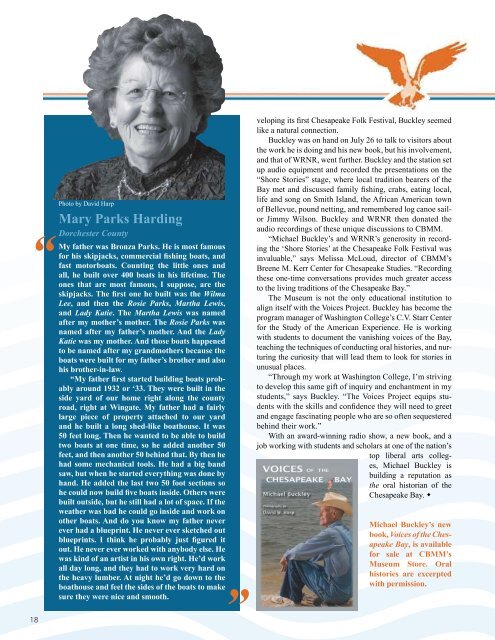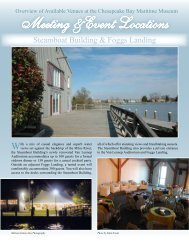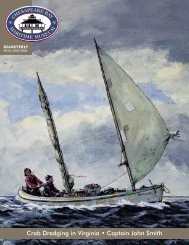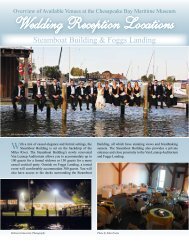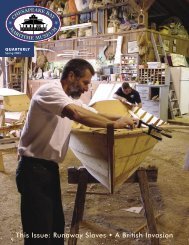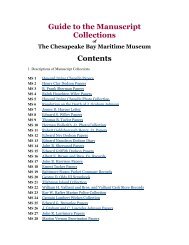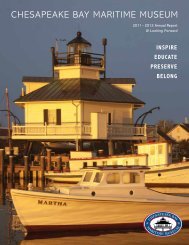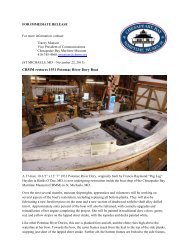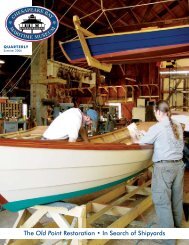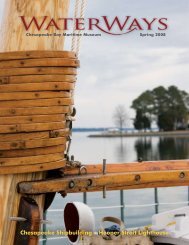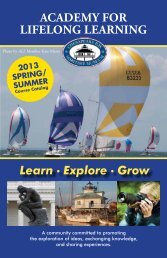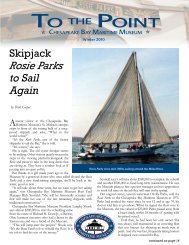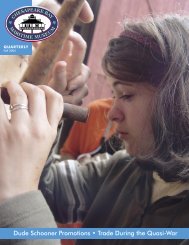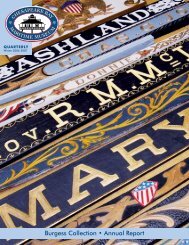Fall 2008 - Chesapeake Bay Maritime Museum
Fall 2008 - Chesapeake Bay Maritime Museum
Fall 2008 - Chesapeake Bay Maritime Museum
You also want an ePaper? Increase the reach of your titles
YUMPU automatically turns print PDFs into web optimized ePapers that Google loves.
18<br />
Photo by David Harp<br />
Mary Parks Harding<br />
Dorchester County<br />
My father was Bronza Parks. He is most famous<br />
for his skipjacks, commercial fishing boats, and<br />
fast motorboats. Counting the little ones and<br />
all, he built over 400 boats in his lifetime. The<br />
ones that are most famous, I suppose, are the<br />
skipjacks. The first one he built was the Wilma<br />
Lee, and then the Rosie Parks, Martha Lewis,<br />
and Lady Katie. The Martha Lewis was named<br />
after my mother’s mother. The Rosie Parks was<br />
named after my father’s mother. And the Lady<br />
Katie was my mother. And those boats happened<br />
to be named after my grandmothers because the<br />
boats were built for my father’s brother and also<br />
his brother-in-law.<br />
“My father first started building boats probably<br />
around 1932 or ‘33. They were built in the<br />
side yard of our home right along the county<br />
road, right at Wingate. My father had a fairly<br />
large piece of property attached to our yard<br />
and he built a long shed-like boathouse. It was<br />
50 feet long. Then he wanted to be able to build<br />
two boats at one time, so he added another 50<br />
feet, and then another 50 behind that. By then he<br />
had some mechanical tools. He had a big band<br />
saw, but when he started everything was done by<br />
hand. He added the last two 50 foot sections so<br />
he could now build five boats inside. Others were<br />
built outside, but he still had a lot of space. If the<br />
weather was bad he could go inside and work on<br />
other boats. And do you know my father never<br />
ever had a blueprint. He never ever sketched out<br />
blueprints. I think he probably just figured it<br />
out. He never ever worked with anybody else. He<br />
was kind of an artist in his own right. He’d work<br />
all day long, and they had to work very hard on<br />
the heavy lumber. At night he’d go down to the<br />
boathouse and feel the sides of the boats to make<br />
sure they were nice and smooth.<br />
veloping its first <strong>Chesapeake</strong> Folk Festival, Buckley seemed<br />
like a natural connection.<br />
Buckley was on hand on July 26 to talk to visitors about<br />
the work he is doing and his new book, but his involvement,<br />
and that of WRNR, went further. Buckley and the station set<br />
up audio equipment and recorded the presentations on the<br />
“Shore Stories” stage, where local tradition bearers of the<br />
<strong>Bay</strong> met and discussed family fishing, crabs, eating local,<br />
life and song on Smith Island, the African American town<br />
of Bellevue, pound netting, and remembered log canoe sailor<br />
Jimmy Wilson. Buckley and WRNR then donated the<br />
audio recordings of these unique discussions to CBMM.<br />
“Michael Buckley’s and WRNR’s generosity in recording<br />
the ‘Shore Stories’ at the <strong>Chesapeake</strong> Folk Festival was<br />
invaluable,” says Melissa McLoud, director of CBMM’s<br />
Breene M. Kerr Center for <strong>Chesapeake</strong> Studies. “Recording<br />
these one-time conversations provides much greater access<br />
to the living traditions of the <strong>Chesapeake</strong> <strong>Bay</strong>.”<br />
The <strong>Museum</strong> is not the only educational institution to<br />
align itself with the Voices Project. Buckley has become the<br />
program manager of Washington College’s C.V. Starr Center<br />
for the Study of the American Experience. He is working<br />
with students to document the vanishing voices of the <strong>Bay</strong>,<br />
teaching the techniques of conducting oral histories, and nurturing<br />
the curiosity that will lead them to look for stories in<br />
unusual places.<br />
“Through my work at Washington College, I’m striving<br />
to develop this same gift of inquiry and enchantment in my<br />
students,” says Buckley. “The Voices Project equips students<br />
with the skills and confidence they will need to greet<br />
and engage fascinating people who are so often sequestered<br />
behind their work.”<br />
With an award-winning radio show, a new book, and a<br />
job working with students and scholars at one of the nation’s<br />
top liberal arts colleges,<br />
Michael Buckley is<br />
building a reputation as<br />
the oral historian of the<br />
<strong>Chesapeake</strong> <strong>Bay</strong>. <br />
Michael Buckley’s new<br />
book, Voices of the <strong>Chesapeake</strong><br />
<strong>Bay</strong>, is available<br />
for sale at CBMM’s<br />
<strong>Museum</strong> Store. Oral<br />
histories are excerpted<br />
with permission.


